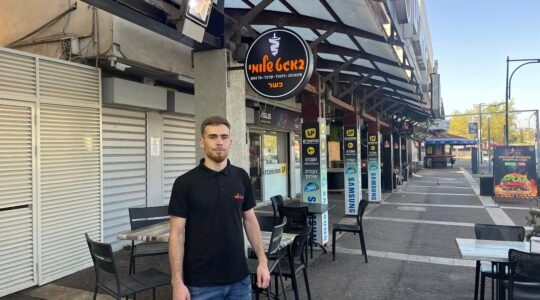SDEROT, Israel (JTA) – Once a sleepy Negev town, Sderot has become a place where residents take sedatives to get through the days and sleeping pills to make it through the nights.
After seven years of rocket fire from the nearby Gaza Strip and no end in sight, the ceaseless barrage is pitting husbands against wives over the decision of whether or not to stay and leaving crippled businesses to survive on hope and loans.
Many of those who can afford to have left.
About 4,000 of the town’s 23,500 people have moved out in the past two years, according to municipal figures. Many more say they would leave if they could.
According to a recent poll published in Yediot Achronot, 64 percent of Sderot’s residents would go if given the financial assistance.
“There are people who are selling, but there is no one to buy,” said Yakov Levy, a realtor in town. “People cannot go, so they feel stuck. If only they could sell their homes they would go.”
Home prices have fallen by 50 percent, Levy said, with the cheapest apartments on the market for just $15,000 and the most expensive houses for about $200,000. Prices were nearly double that in 2000, before the daily rocket fire began.
“We are suffering, not just me, but all of us. The strong ones left, the weaker stay on and everyone complains,” Levy said. “We are waiting for better days but do not see a solution because things have gone on for so long now. If the situation continues, however, the only things left standing here will be the buildings.”
After seven years of ongoing rocket fire, residents of this working-class town seem divided between defiant and defeated.
Although they all speak of the power of Sderot’s close-knit community, some talk openly about their desire to leave to regain some semblance of a normal life. Others say that despite the difficulties, the only home they know is Sderot and to abandon it would show the Palestinians firing the rockets that Israelis’ spirit can be broken.
Last week, Palestinians in Gaza fired an Iranian-made Katyusha rocket that reached Ashkelon, a city of some 120,000 about eight miles north of the strip. The rocket served as a reminder that Sderot is not alone in the danger zone around Gaza.
Sderot’s economic downturn began when it became the target of constant Kassam rocket fire from Gaza. The attacks, which intensified after Israel withdrew from Gaza in August 2005, have thus far claimed 13 Israeli lives.
The damage to residents’ psyches, homes, businesses and families has been far reaching.
Between 20 to 30 percent of businesses in Sderot and surrounding areas have shut down, said Daniel Dahan, a supermarket owner who heads an organization of local businesspeople. Overall sales at the stores that remain open have dropped by nearly 50 percent, he said.
Dahan says families are struggling to get by on reduced salaries and many find themselves divided over whether to stay or leave Sderot.
Often the husband will have taken out several loans and dipped heavily into family savings to keep the business afloat. The wife, distressed at the mounting debt and the danger to their children from the rocket fire, pushes for leaving.
Stories of divorce have become common here, Dahan says.
“What happens is that a business owner comes into work and finds it difficult to manage things because of the pressures from home, concerns over the children and his workers,” Dahan said, describing how the security situation creates a ripple effect of stress. “The wife wants to leave and the husband does not want to because of the business, and the wife says, ‘If something happens to the kids it will be your fault.’ ”
He said the ramifications of the economic crisis have slowly begun to sink in.
“It’s like an illness that has taken over us. At first we businesspeople did not believe it could kill us off,” Dahan said. “We have lived like patients who have been warned of health hazards by our doctor, but now we feel like we have had the heart attack.
“Some of us who have businesses feel it is a condition we can live with and take another loan. Others understand it’s a deadly disease and we have no choice but to walk away.”
Shimon, a grocer in Sderot’s open-air market, says he doesn’t want assistance to leave; he wants the government to strike back at the militant groups in Gaza.
“I’ve been working in the market for more than 30 years,” he told JTA. “I’m not going anywhere now. I raised my four kids here; my wife’s family is from Sderot. There’s nowhere else for us to go.
“I haven’t had a good night’s sleep in eight years. I bolt awake at the slightest movement or noise outside the house. I just want the government to make sure that we can get back to living like normal people.”
Israel has stepped up its strikes in recent weeks against Gaza militants, particularly those firing rockets at Israelis and smuggling in weaponry, but the government remains wary of a large-scale invasion of Gaza. A major incursion could cost Israel heavily in terms of its soldiers’ lives, Palestinian civilian lives and international credibility. It also would not put an end to the rocket fire, analysts warn.
Atara Orenbouch and her husband, Orthodox Jews originally from the center of the country, moved to Sderot nine years ago. They said they moved to try to make a difference in the community. Both are educators – she teaches computer science and her husband is a yeshiva principal. They have four children.
Orenbouch says she tries to do all her family’s shopping in Sderot.
“There have been economically terrible times,” she said, recounting a period last spring when a particularly heavy period of rocket barrages sent many residents out of town. “I went to the supermarket and it was empty. I saw a man throwing away unsold vegetables and there were no lines.”
Orenbouch’s children now all sleep in bunk beds in the family’s “safe room,” which is made of reinforced concrete to protect against the crude Kassam rockets.
She says she and her neighbors are doing their best to persevere and stay, but the fear of being caught by a rocket and the question of where to run for cover is never far away.
“It gets to you. You think about it all the time – at synagogue, at lunch with friends,” Orenbouch said. “You are always thinking: If there were an alarm now, where would the safest place be to hide?”





